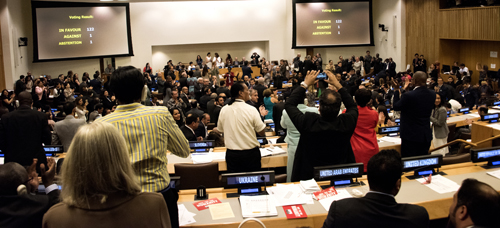

On 7 July, the United Nations passed a treaty forbidding the development, testing, production, possession, transfer, use and threatened use of nuclear weapons or other nuclear explosive devices.
Costa Rican diplomat Elayne Whyte Gómez, president of the abolition conference, said: ‘We all feel very emotional today. We feel that we are responding to the hopes and to the dreams of present and future generations – that we undertake our responsibility as a generation to do whatever is in our hands to achieve and to move the world toward the dream of a world free of nuclear weapons.’
Setsuko Thurlow, a survivor of the Hiroshima bombing, said: ‘I have been waiting for this day for seven decades and I am overjoyed that it has finally arrived.
‘This is the beginning of the end of nuclear weapons.’
‘Nuclear weapons have always been immoral,’ she went on: ‘Now they are also illegal. Together, let us go forth and change the world’.
WMDs illegal
The 2017 Treaty on the Prohibition of Nuclear Weapons joins the 1972 Biological Weapons Convention and the 1993 Chemical Weapons Convention, meaning that all weapons of mass destruction will be banned by law when 50 countries have formally ratified the latest treaty. (It opens for signature on 20 September.)
The new agreement was the first multilateral nuclear disarmament treaty in 20 years, since the Comprehensive Nuclear Test Ban Treaty (CTBT).
The CTBT and the Biological Weapons Convention were both adopted by the UN general assembly; the Chemical Weapons Convention was adopted by the standing UN Conference on Disarmament.
The nuclear abolition treaty, in contrast, was voted on at a special two-part UN conference in New York. (A day-by-day grassroots account of the second part of the conference is on pp7–10.)
In the vote, 122 nations voted in favour of the treaty, one country voted against (NATO member, the Netherlands) and one abstained (Singapore).
The nine nuclear weapon states (Britain, China, France, India, Israel, North Korea, Pakistan and the US) all refused to take part in the conference in any way.
Britain, France and the US put out a joint statement saying: ‘This treaty offers no solution to the grave threat posed by North Korea’s nuclear program, nor does it address other security challenges that make nuclear deterrence necessary.’

